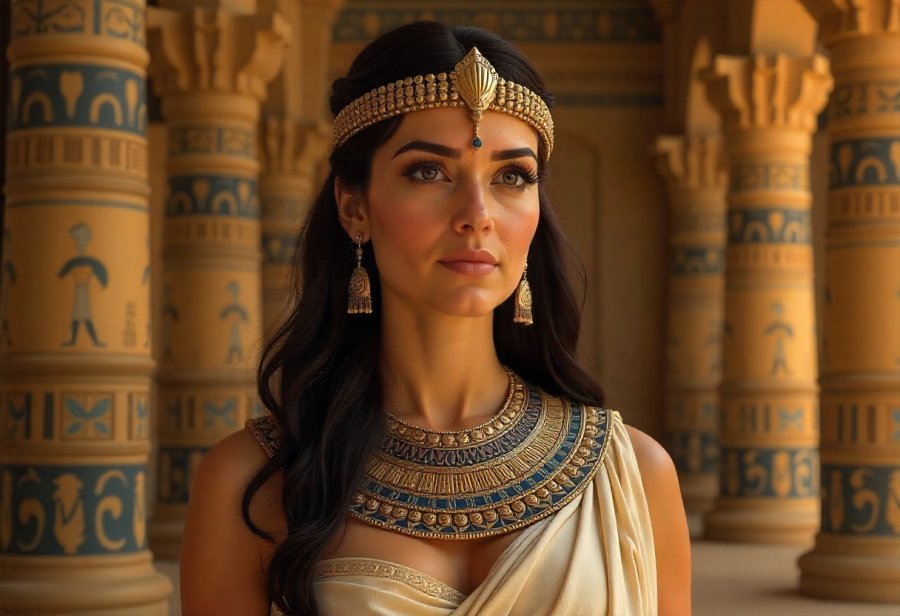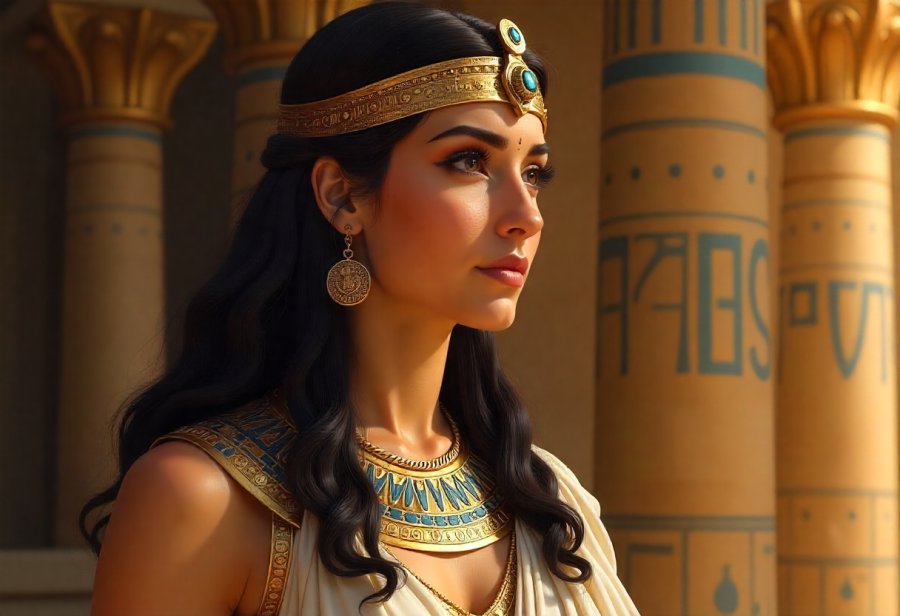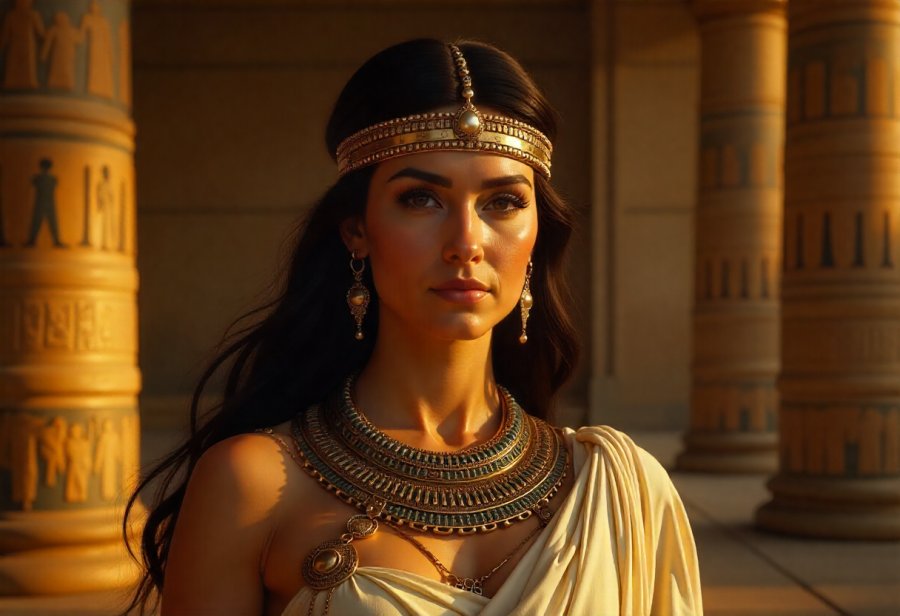
Beyond Hollywood’s glamorous myth lies Cleopatra VII, a ruler defined not by beauty but by unparalleled intellect, strategic brilliance, and cultural mastery. Her legacy challenges us to see her as a visionary leader who navigated the turbulent political landscape of ancient Egypt with wit and resilience. Did her true power reside in her mind, her diplomacy, or her ability to adapt amid chaos? This portrayal uncovers her deep engagement with learning, multilingual diplomacy, and her keen understanding of cultural symbols—tools she wielded to maintain Egypt’s independence against Rome. Her relationships with Julius Caesar and Mark Antony weren’t mere romance but calculated alliances rooted in statecraft. By reexamining her life beyond myth, we recognize Cleopatra as a master strategist—an influential figure whose influence was built on wisdom, resilience, and cultural insight. Is her real legacy the triumph of intelligence over superficial charm? An inspiring story of leadership that still resonates today.

Unveiling Cleopatra: Beyond Hollywood Glamour, A Leader of Sharp Mind and Political Mastery
Cleopatra VII is often remembered through Hollywood’s lens as a glamorous figure, but her true legacy runs much deeper. Beneath the myth lies a leader whose strength was rooted in her sharp mind, strategic thinking, and mastery of politics. She was not merely a woman of beauty; she was a highly educated scholar, fluent in multiple languages, and deeply engaged in the cultural and political currents of her time. Her ability to navigate the complex world of ancient power was driven by intelligence, wit, and foresight—traits that made her a formidable ruler.
Cleopatra’s influence was built on her capacity to think critically and act strategically. She understood that alliances, cultural symbolism, and diplomacy held more power than brute force alone. Her relationships with Rome’s most influential men, Julius Caesar and Mark Antony, weren’t just personal; they were calculated moves to protect Egypt’s independence and stability. Her leadership style combined cultural awareness with political acumen, allowing her to maintain her throne amidst turbulent times.
Far from the Hollywood image of a seductress, Cleopatra’s true strength lay in her ability to adapt and her mastery of statecraft. She viewed education and knowledge as vital tools for leadership, supporting scholars and patronizing the arts. Her connection to the legendary Library of Alexandria exemplifies her deep commitment to learning and cultural progress. These pursuits weren’t just personal interests—they were strategic assets that bolstered her diplomatic influence and reinforced her legitimacy as a ruler.
Egypt during her reign was a land caught between tradition and change. Her Macedonian heritage blended with Egypt’s ancient customs, creating a leadership style that emphasized both cultural continuity and political resilience. Her multilingual skills and understanding of religious traditions allowed her to communicate effectively across diverse audiences and forge alliances essential for her survival. Cleopatra knew that true power came from a combination of knowledge, diplomacy, and cultural symbolism.
This focus on intelligence and strategic thinking redefines how we view her impact. Her legacy isn’t just about her relationships or her image but about her ability to lead through understanding and adaptability. She demonstrated that influence stems from a well-informed mind, cultural fluency, and resilience—qualities that enabled her to steer Egypt through one of its most unstable periods. Recognizing Cleopatra’s true qualities encourages a shift in perspective, highlighting her as a leader who prioritized education, diplomacy, and strategic vision over superficial charm.
Egypt’s Turbulent Heart: Cultural Merging and Political Intrigue in Cleopatra’s Reign
During Cleopatra’s reign, Egypt was a land of both wealth and turbulence. The Ptolemaic dynasty, of Macedonian Greek origin, had established itself after Alexander the Great’s conquest, creating a unique cultural landscape where Greek traditions intertwined with Egypt’s ancient customs. Alexandria, her capital, stood as a vibrant hub of learning, arts, and scholarly exchange, reflecting her deep commitment to knowledge and diplomacy. The city’s libraries and academies fostered a spirit of inquiry that extended beyond mere scholarship into the realm of political strategy.
Egypt’s political environment was fraught with internal rivalries and regional power struggles. Noble families and provincial governors vied for influence, forcing Cleopatra to master court politics and forge alliances carefully. She balanced the divine authority of traditional Egyptian religion with her Macedonian heritage, understanding that her legitimacy depended on blending these elements seamlessly. This delicate dance of cultural and political authority was crucial to maintaining her throne amid constant threats from both internal factions and external forces.
The rising influence of Rome added a new layer of complexity to her rule. As the Roman Republic expanded its reach, Egypt’s independence was increasingly under threat. Cleopatra’s predecessors had faced external invasions, but she recognized diplomacy as her strongest weapon. Her marriages and alliances with Julius Caesar and Mark Antony weren’t merely personal choices—they were strategic moves to safeguard Egypt’s sovereignty. These relationships exemplified her skill in navigating the shifting tides of power, always aiming to preserve her kingdom’s stability.
Her early education played a pivotal role in shaping her political instincts. Fluent in Greek, Egyptian, and Latin, Cleopatra was well-versed in philosophy, rhetoric, and governance. Her multilingual abilities allowed her to communicate directly with diverse audiences—an invaluable asset in a multicultural court. Her exposure to Egyptian religious traditions and Greek philosophies gave her a nuanced understanding of her cultural landscape, enabling her to legitimize her rule through both tradition and innovation.
Culturally, Egypt was a melting pot of Greek and Egyptian influences. Cleopatra leveraged this duality by participating actively in religious rituals and promoting traditional symbols of kingship. She aligned herself with divine authority, using religious and cultural symbols to unify her people and strengthen her legitimacy. Her ability to navigate and synthesize these traditions helped her foster loyalty, even when external pressures threatened her reign.
Her leadership was characterized by adaptability and strategic thinking. Recognizing that rigid plans often failed in volatile circumstances, she remained flexible, exploring new alliances and adjusting her tactics as needed. This agility allowed her to respond swiftly to internal unrest and external threats, ensuring her survival in a tumultuous political landscape. Cleopatra’s mastery of language, culture, and diplomacy set her apart from many rulers of her time, revealing a leader who understood that influence depends on understanding others and managing complex relationships.

Myth Versus Reality: Reassessing Cleopatra’s Image as a Leader and Scholar
For centuries, Cleopatra’s image has been shaped by stories that emphasize her beauty and romantic liaisons, often overshadowing her true qualities as a leader and scholar. Popular narratives tend to portray her mainly as a seductress who used charm to manipulate powerful men like Julius Caesar and Mark Antony. While her allure was real, reducing her to that superficial trait diminishes her intelligence and political skill, oversimplifying her complex character.
Modern scholarship challenges these outdated perceptions. Researchers now highlight Cleopatra’s mastery of diplomacy, her linguistic talents, and her dedication to Egyptian culture and governance. She was a highly educated ruler who understood that influence came through knowledge, strategic alliances, and cultural fluency—traits that helped her maintain her throne and defend Egypt’s independence. Seeing her as a shrewd strategist shifts the focus away from superficial glamour to her genuine capabilities.
Hollywood’s depiction of Cleopatra as a glamorous seductress also fuels a skewed legacy. Films and media often focus on her romantic relationships, portraying her as a victim of circumstance or a tragic lover. These stories tend to ignore her political acumen, scholarly pursuits, and her skill in navigating complex geopolitics. This narrow storytelling reinforces stereotypes that emphasize surface attributes rather than her true leadership qualities.
This disconnect between her real achievements and her mythologized image creates a distorted narrative. It makes her seem more like a myth than a genuine leader who wielded influence through intelligence and resilience. Focusing predominantly on her romances diminishes her accomplishments and perpetuates stereotypes about women in power. Recognizing her true strengths as a strategic thinker and cultural diplomat paints a more accurate picture of her legacy.
Recent scholarship aims to reframe Cleopatra’s story, emphasizing her scholarly pursuits, patronage of learning, and leadership rooted in wisdom. Her influence extended beyond superficial charm—she understood the importance of cultural identity, education, and adaptability. This broader view reveals a leader whose impact was built on her mind, resilience, and strategic vision, rather than just her appearance or romantic entanglements.
Stories often distort history, especially when surface traits overshadow true leadership. Cleopatra’s legacy is rooted in her intelligence, resilience, and ability to adapt—traits that allowed her to lead effectively and leave a lasting mark. Separating myth from reality helps us appreciate her as a multifaceted figure, whose influence was based on her mind and strategic insight, not just mythic glamour.
Understanding her true story reveals a leader who mastered diplomacy, cultural symbolism, and resilience. Her myths and media portrayals may have exaggerated her beauty and romantic life, but her real power lay in her intellect and political skill. Her legacy challenges us to see leadership as rooted in wisdom and adaptability, qualities that made her one of history’s most formidable figures.
By exploring her scholarly pursuits and leadership qualities more deeply, we gain a richer understanding of her true legacy. For those interested in learning more about Cleopatra’s intellectual achievements and historic influence, a detailed overview can be found at this resource on Cleopatra’s leadership and scholarship, which provides further insights into her multifaceted role as a ruler and scholar.
Lessons from Cleopatra: Applying Ancient Strategies to Modern Leadership
Cleopatra’s leadership qualities continue to resonate today, offering valuable lessons for modern strategists and leaders. Her ability to adapt swiftly to changing circumstances highlights how flexibility and open-mindedness are crucial in decision-making. She understood that rigid plans often falter in unpredictable environments, so she remained agile, ready to explore new alliances or adjust her tactics as needed. This kind of strategic adaptability is essential for today’s leaders navigating a complex and volatile world.
Her mastery of diplomacy and cultural understanding stands out as timeless strengths. Cleopatra knew that building trust across diverse cultures was key to forging lasting alliances. In our interconnected world, effective leaders must be skilled in cross-cultural communication and negotiation. Her example reminds us that influence often depends more on emotional intelligence and relationship-building than on sheer power or force.
Resilience is another core trait she exemplified. Cleopatra faced internal betrayals, external threats, and relentless pressure to maintain her throne. Yet, she stayed resilient, employing patience and resourcefulness to turn setbacks into opportunities. Modern leaders can learn from her ability to withstand obstacles and remain focused on long-term goals, instead of being diverted by short-term crises.
She also demonstrated the importance of balancing knowledge with action. Cleopatra prioritized continuous learning—studying languages, cultures, and governance—so her decisions were well-informed. Today, ongoing education and awareness are vital for effective leadership. Leaders who stay curious and engaged can craft nuanced strategies that resonate and endure over time.
Cultural symbols and religious authority played a powerful role in Cleopatra’s leadership. She understood how shared values and traditions could inspire loyalty and unify her people. Modern leaders can draw from this by emphasizing core values and cultural identity to foster trust and legitimacy. Symbols and shared narratives can serve as rallying points that strengthen communal bonds and reinforce authority.
Her skill in negotiation and partnership-building underscores a fundamental truth: influence thrives on collaboration. Cleopatra valued mutual benefit and trust, demonstrating that sustainable success stems from creating genuine alliances. Today’s leaders can adopt this approach by focusing on building networks that support long-term growth instead of seeking quick wins.
Cleopatra’s story reminds us that true power lies in wisdom, resilience, and strategic thinking. Her legacy encourages modern leaders to prioritize these qualities above superficial attributes like charm or appearance. By embodying intelligence and adaptability, they can navigate complex challenges and leave a lasting impact—just as Cleopatra did in her time.

Reclaiming Her Legacy: The True Power of Cleopatra’s Intelligence and Resilience
Cleopatra’s influence extended far beyond her romantic liaisons or the mythic glamour often associated with her name. Her true power lay in her sharp intellect, strategic mindset, and leadership finesse. She understood that in a turbulent world, influence was rooted in knowledge, cultural fluency, and resilience—qualities she cultivated through years of education, diplomacy, and adaptability. By blending her deep understanding of Egyptian traditions with her Macedonian heritage, Cleopatra crafted a leadership style grounded in diplomacy, symbolism, and long-term vision. This approach allowed her to maintain her throne amid external threats and internal unrest, leaving a legacy of a ruler who led with wisdom and resilience.
Looking beyond the myths, Cleopatra emerges as a master strategist who knew the importance of forging alliances, managing court politics, and leveraging cultural symbols to legitimize her authority. Her mastery of multiple languages, her patronage of learning, and her ability to adapt to shifting circumstances made her a formidable leader. Her influence was rooted not in superficial charm but in her capacity to think critically and act decisively—traits that remain relevant today. Her legacy challenges us to view leadership as a blend of intelligence, resilience, and strategic insight, rather than surface attributes.
Reevaluating Cleopatra’s story also involves disentangling fact from fiction. Her romantic entanglements and beauty, while real, often overshadow her substantial achievements as a scholar, diplomat, and political tactician. The stories that emphasize her allure tend to diminish her true strengths, reducing her to a figure of myth rather than a leader who understood the power of cultural identity and education. Recognizing her authentic qualities allows us to appreciate her as a complex figure—one whose influence was built on her mind and resilience, not just her appearance.
Her leadership provides timeless lessons: influence is rooted in wisdom, adaptability, and resilience. Cleopatra’s example reminds modern leaders that superficial attributes fade, but qualities like strategic thinking and cultural understanding endure. Her legacy encourages us to see leadership as a continuous process of learning and adaptation—traits that help navigate today’s fast-changing global landscape. Her story isn’t just a chapter of history; it’s a blueprint for effective, resilient leadership.
Ultimately, Cleopatra’s true power was her mind. Her ability to think critically, forge strategic alliances, and navigate complex cultural landscapes defined her reign. Her influence was driven by her mastery of diplomacy, her resilience in the face of adversity, and her commitment to knowledge. These qualities enabled her to steer Egypt through one of its most unstable periods and leave a lasting mark on history. Her legacy challenges us to value wisdom over superficial charm and to recognize that genuine leadership is rooted in intellect and resilience. Cleopatra’s story remains a compelling testament to the enduring strength of strategic, informed leadership.




